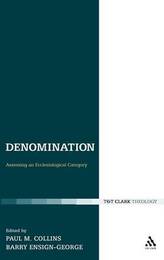
|
Denomination: Assessing an Ecclesiological Category
Hardback
Main Details
Description
The term "denomination" is now widely used to describe a Christian community or church. But what is a 'denomination'? In this highly creative collection of essays, representatives of all major Christian traditions give an answer to this question. What does the term mean in their own tradition? And does that tradition understand itself to be a 'denomination'? If so, what is that understanding of 'denomination'; and if not, how does the tradition understand itself vis a vis those churches which do and those churches which do not understand themselves as 'denominations'? In dialogue with the argument and ideas set forth in Barry Ensign-George's essay, each contributor offers a response from the perspective of a particular church (tradition). Each essay also considers questions concerning the current landscape of ecumenical dialogue; ecumenical method and the goals of the ecumenical movement; as well as questions of Christian identity and belonging.
Author Biography
Revd Dr Paul M. Collins, formerly Reader in Theology at the University of Chichester, Parish Priest on Holy Island, Northumberland, England. Barry Ensign-George is a Minister of Word and Sacrament in the Presbyterian Church (U.S.A.), which he serves as Associate for Theology in the denomination's Office of Theology & Worship.His reaserch is focused on ecclesiology, particularly on formulating a theological assessment of denomination as an ecclesiological category.
Reviews'With the collapse of classical ecumenism and the emergence of new divisions in the church, the time is ripe for a fresh theological look at the contentious issue of denominationalism. This volume tackles the thorny issues cleanly and forthrightly. Both those who are repelled by the whole idea of denominationalism and those who want to retrieve and fix it will find this splendid volume invaluable in thinking through their positions.' - William J. Abraham, Perkins School of Theology, Southern Methodist University, USA. -- William J. Abraham 'What is a denomination? Does it differ from a convention, fellowship, synod, or church? Is it primarily a sociological or a theological term? Denominational consciousness stands for particularity relative to the whole church. The premier ecclesiologists who discuss the nature, function, and relevance this term in an ecumenical age display the diversity of their denominational points of view. As denominations wane in the West and never quite take hold in cultures that do not share the history that generated them, will the gifts that each preserves for the whole church be lost? These analysts throw distinctive light on these issues and by so doing relativize the narrowness of denominational consciousness and help expand the vision of the larger church in which the denominations participate. This topic and these superb treatments of it provide a unique entree into the ecumenical vision that people from all the denominations will appreciate. As a whole the book represents a quiet, conversational but brilliant essay in comparative ecclesiology that no course in ecumenism can neglect.' - Roger Haight, S. J., Scholar in Residence, Union Theological Seminary, USA. -- Roger Haight, S. J. ... an important collection... looking at the issue of denominationalism from theological, ecumenical and sociological perspectives... Highly recommended. -- Church of England Newspaper As the blurb states, this book will indeed be a text for my next course on "Unity in Division". It offers challenging perspectives on bringing theological perspectives to the social realities which shape many churches in today's western world- and beyond. -- One in Christ The core of the book is in the first two chapters with what remains being elaboration or rejection of the category in a variety of traditions including Baptist, Lutheran, United Methodist, Pentecostal, Presbyterian and Roman Catholic. Although all of this is interesting, the real interest is in the dialectic of the first two chapters which constitute a sharp if amicable stand-off between Barry Ensign-George of the Presbyterian Church and Paul Avis of the Church of England. -- Nigel G. Wright, Spurgeon's College, London * Regent's Reviews *
|